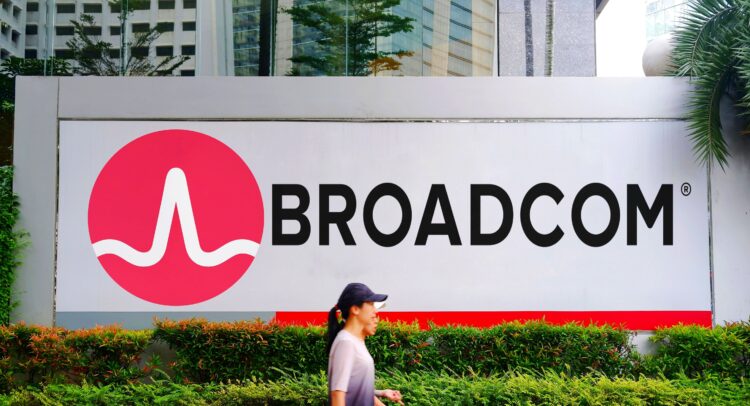Don’t worry if you missed Nvidia (NVDA) before it went to the moon (now trading at 47 times forward earnings). There may be another stock that could give you the capital appreciation you’re looking for, and that stock is Broadcom (AVGO). Broadcom has become Wall Street’s favorite AI chipmaker after posting a beat and raise in the second quarter and quietly joining the top 15 companies in the S&P 500 by market value.
Discover the Best Stocks and Maximize Your Portfolio:
- See what stocks are receiving strong buy ratings from top-rated analysts.
- Filter, analyze, and streamline your search for investment opportunities with TipRanks’ Stock Screener.
This latest move has little to do with its digestion of an accretive acquisition, which I’ll get to in a minute, but largely to do with its capabilities in making highly specific custom AI chips for companies like Alphabet (GOOGL). While retail investors are excited about the stock split because shares have become more accessible, they should know that a stock split does not impact fundamentals.
I’m bullish on Broadcom because of how well it’s digesting the VMware acquisition, its strong cash generation capabilities, and the fact that it’s one of the best AI stories in the market right now.

Brilliant Capital Allocation and Strong Cash Generation Capabilities
Broadcom has a successful track record of acquiring and integrating good businesses and has built itself into a conglomerate of profitable semiconductor and software companies. The company’s most recent purchase was its $69 billion acquisition of cloud computing and virtual machine software company VMware, which is panning out nicely.
Broadcom is doing what it does best: cutting costs and maximizing profits. Management is shifting VMware to a subscription model and has already signed up 30% of its 10,000 largest clients to adopt it. Since the deal’s closing, the company has reduced VMware’s spending run rate by 30% and intends to stabilize it at $1.2 billion per quarter after the complete integration of the business, down nearly 50% from the pre-acquisition spending run rate per quarter.
Broadcom ended the quarter with a gross debt position of $74 billion and $9.8 billion in cash. I’m not too worried about the company’s large debt position, given how profitable it is and its ability to convert profits to cash. Take Fiscal 2023, for example; the company ended the year with free cash flow of $17.6 billion, and its net income was $14 billion. That gives it an FCF to net income ratio of 1.26, or in other words, it turned 126% of its profits into cash.
Over the past 10 years, Broadcom has grown its net income annually by 49% and its free cash flow by 37%. Its double-digit FCF growth rates are why I’m not too worried about its debt. But is Broadcom really that profitable? The company’s high gross margins tell me it has pricing power, but more importantly, its high operating margins tell me it can manage its fixed costs. Therefore, Broadcom is a highly profitable company, a good capital allocator, and has strong cash generation capabilities.
One of the Best AI Stories in the Market
Broadcom has one of the most exciting AI stories, and I see a lot of growth in its AI-related business. The company’s lead products include its custom ASICs, or application-specific integrated circuits, which are highly specific chips tailored for applications such as machine learning. The company makes custom AI chips for major hyperscalers, including Google, Meta (META), and TikTok-owner ByteDance.
Broadcom’s AI revenue grew 280% year-over-year in Q2 2024 to $3.1 billion. That’s about a quarter of its total revenue of $12.5 billion for the quarter. For the full year, management raised its AI revenue guidance to $11 billion from $10 billion previously. I believe this new number is rather conservative, considering that major hyperscalers have all raised their CapEx guidance and announced billions of dollars in data center spending for the year.
This is a significant tailwind for Broadcom, and management is forecasting rather modest growth, even after saying it secured new contracts for custom AI accelerators from its hyperscaler customers. While I cannot predict what this number could be, I have high conviction that it can potentially exceed guidance.
You might wonder what’s so special about Broadcom because Nvidia also makes AI chips. Nvidia makes GPUs, or graphics processing units, which are really powerful general processors that are good at a variety of tasks. GPUs are relatively more complex circuits than ASICs and, therefore, have more overhead costs associated with them. ASICs strip away the unnecessary circuitry to focus on one task and are, as a result, more cost-efficient.
Broadcom has an estimated 55-60% market share in the custom ASIC market, and its top competitor in the space is Marvell Technology (MRVL), with a 13-15% market share.
Bernstein’s managing director and senior analyst, Stacy Rasgon, says Broadcom has the “second best AI story” after Nvidia, and I agree with that. The analyst likes Broadcom for its AI business and anticipates significant revenue growth from VMware. Shortly after the company’s earnings beat, Rasgon raised his price target on AVGO to $1,900 ($190 split-adjusted) from $1,650 and maintained an Outperform recommendation.
Bonus: Software Gives Broadcom Good Revenue Diversification
Another reason I am bullish on Broadcom is its revenue diversification, particularly in software, where it has developed a strong position with strategic acquisitions over time. This limits the company’s risk to a potential AI bubble that the market has raised concerns about. Broadcom’s Infrastructure Software revenue grew 175% year-over-year to $5.3 billion in Q2 2024, of which $2.7 billion came from VMware.
Management expects VMware to grow to $4 billion in revenue per quarter and its operating margins to catch up with its software segment’s margins by 2025. If there is a bubble, you’re better off being invested in Broadcom than some chipmaker that does not have another revenue stream.
The Takeaway
So you missed Nvidia, and now it’s overbought, trading at 47 times its forward earnings — certainly not a bargain. You can look at Broadcom instead, which is trading at 36 times this year’s earnings estimate. While AVGO has an ambitious price, there’s a lot of growth here, and investors may assign it a higher P/E multiple as it gains further market share.









